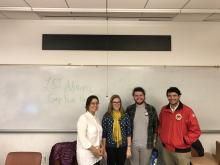By Starla Sampaco | LSJ Communications Assistant
Some students may feel confident in their decisions to go straight to law school or graduate school after graduating from college. But that isn’t the case for everyone. If you are thinking about going to graduate school but are unsure about the next steps to take after graduating, you are not alone.
Taking gap years might be a good option to consider.
It is important to remember that gap years are not years “off,” but years “on.” Whether recent graduates decide to travel or work, gap years are a time of immense personal growth and skill development.
The Law, Societies & Justice Program (LSJ) invited Martina Kartman (LSJ ‘09), Hayley Edmonston (LSJ ‘13), Zach Hunter (LSJ ‘16) and Sam Svilar (LSJ ‘16) to speak to current LSJ students about their decisions to take gap years between their undergraduate and graduate educations.
The following are the top four ways our panelists benefitted from gap years:
#1 Practical experience and career skills
Experiences outside of the classroom helped our panelists develop skills that will benefit their careers.
Kartman spent six years immersed in experiences related to criminal justice and human rights prior to attending the University of Washington School of Law.
She has worked as a law clerk in both Washington, D.C. and Miami. Kartman was also an analyst for the Seattle Office for Civil Rights. And prior to this, she spent two years working for Columbia Legal Services (CLS) as a program assistant. According to her LinkedIn profile, Kartman was involved with the Institutions Project and represented people detained in state prisons, mental hospitals and juvenile facilities.
These experiences gave her the passion and dedication that currently motivate her studies in law school and also gave her valuable career skills.
#2 Personal growth and new perspectives
Each of our panelists mentioned personal growth as a major benefit of taking gap years.
Svilar is currently a City Year member. He chose this line of work because of the program’s mission to close the achievement gap in high-poverty areas.
Serving students in under-resourced schools has been a transformative experience for Svilar.
“I didn’t understand the implication of committing to service until I started working 10 hours a day,” he said.
Like Svilar, Hunter is currently taking a gap year. He is an Americorps member with the United Way of King County. This experience has given him a new perspective on what he wants out of his career.
“There’s a lot of pressure for people to define their own success through money,” Hunter said. “It’s empowering to define your own meaning of success.”
Kartman also spoke about the perspective she gained from her gap year. She travelled across East Africa, the Caribbean, Central America and South America as a Bonderman travel fellow for eight months following her graduation from the LSJ Program.
She said the fellowship was a challenging experience that often put her in uncomfortable, unfamiliar situations. This forced her to figure out who she really was, and Kartman returned to Seattle with a new perspective on how she would approach her work.
#3 A competitive edge
Graduate programs are not easy. Whether applicants decide to go to law school or get a MPA, they can expect to be challenged by an intense educational environment. Our panelists emphasized that many individuals may not be ready for this immediately after college.
However, the experiences they had during their gap years helped them prepare for the challenges they faced going into graduate school.
Edmonston is currently working towards a master’s degree in public administration at the UW Evans School of Public Policy and Governance. She said the average age of the program’s incoming students is 27.
“The only thing that differentiates us is our work experience,” Edmonston said.
Because of this, Edmonston said, younger applicants who have less experience could be at a disadvantage.
#4 Clarity
Recent graduates face a lot of ambiguity during their first few years out of college. Even if they have decided on their long-term career goals, it can be difficult to pick a path to get there.
Our panelists said that gap years gave them time to identify their strengths and goals. This helped them narrow down their options when strategizing how they would approach their careers.
For Edmonston, taking gap years helped her decide which graduate program would be the best fit for her.
She did many informational interviews with people of various educational backgrounds, such as people with law degrees and people with master’s degrees in public administration.
Edmonston continues to conduct informational interviews to give her a better a idea of the career options that are available. She estimates that she has done 30 of these interviews in the past year.
Similarly, Kartman spoke about the value of taking the time to think about how her interests and skills could be transferred to an actual career.
“When I was an undergraduate, I knew which issues I cared about, but I didn’t know about the kind of work I could do in those areas,” Kartman said.
Taking six gap years gave Kartman the passion and dedication that motivates her studies in law school and also helped her realize what she wants out of her career.
“Now when I look at jobs, it’s not just about finding jobs that ‘sound rad,’” Kartman said. “I ask myself, ‘Does this match my theory of change? What’s the work/life balance like?’”
